An older adult is diagnosed to be in the early stage of Alzheimer's disease. The diagnosis is made on the presence of which of the following outcomes? (Select all that apply.)
A gradual decline in cognitive abilities
A decline from a previous level of functioning
Easily frustrated
Mild memory loss
Impaired judgement
Correct Answer : A,B,D,E
Choice A reason: This is a correct answer because Alzheimer's disease affects the brain cells and causes them to degenerate and die. This leads to a gradual decline in cognitive abilities, such as memory, language, reasoning, and problem-solving.
Choice B reason: This is a correct answer because Alzheimer's disease interferes with the daily activities and routines of the affected person. They may experience a decline from their previous level of functioning, such as forgetting appointments, misplacing items, or getting lost.
Choice C reason: This is an incorrect answer because easily frustrated is not a specific outcome of the early stage of Alzheimer's disease. Although some people with Alzheimer's disease may become frustrated, irritated, or angry due to their cognitive impairment, this is not a universal or diagnostic symptom.
Choice D reason: This is a correct answer because Alzheimer's disease affects the short-term memory first, causing the person to forget recent events, conversations, or names. This is called mild memory loss, and it is one of the most common signs of the early stage of Alzheimer's disease.
Choice E reason: This is a correct answer because Alzheimer's disease affects the frontal lobe of the brain, which is responsible for executive functions, such as planning, organizing, decision-making, and judgement. This leads to impaired judgement, such as making poor financial choices, neglecting personal hygiene, or acting inappropriately.
Nursing Test Bank
Naxlex Comprehensive Predictor Exams
Related Questions
Correct Answer is B
Explanation
Choice A reason: Performing all activities of daily living (ADLs) and then resting is not a good instruction for the older adult who has COPD, as it can cause fatigue, shortness of breath, and anxiety. The nurse would advise the older adult to pace themselves and prioritize the most important activities, and to take breaks between tasks.
Choice B reason: Bathing and eating slowly with periodic rest is a good instruction for the older adult who has COPD, as it can help conserve energy, prevent dyspnea, and improve digestion. The nurse would advise the older adult to use a shower chair or a handheld showerhead, to avoid hot water or steam, and to use a fan or an open window for ventilation. The nurse would also advise the older adult to eat small, frequent meals, to avoid foods that cause gas or bloating, and to drink fluids between meals rather than with them.
Choice C reason: Walking short distances without oxygen is not a safe instruction for the older adult who has COPD, as it can cause hypoxia, which is a low level of oxygen in the blood. The nurse would advise the older adult to use oxygen therapy as prescribed by their doctor, and to monitor their oxygen saturation with a pulse oximeter. The nurse would also advise the older adult to exercise regularly, but to start slowly and gradually increase the intensity and duration, and to stop if they feel dizzy, chest pain, or severe breathlessness.
Choice D reason: Bathing right after eating and then resting is not a helpful instruction for the older adult who has COPD, as it can cause indigestion, reflux, or aspiration. The nurse would advise the older adult to wait at least an hour after eating before bathing, and to avoid lying down right after eating or bathing. The nurse would also advise the older adult to elevate their head with pillows when resting or sleeping, and to avoid napping during the day.
Correct Answer is D
Explanation
Choice A reason: Evaluating the medication list is a possible step that the nurse can take, as some medications can affect urine concentration or cause dehydration. However, it is not the first step that the nurse should implement, as it does not address the immediate problem of fluid balance.
Choice B reason: Reviewing laboratory reports is another possible step that the nurse can take, as some laboratory tests can indicate the level of hydration or kidney function of the patient. However, it is not the first step that the nurse should implement, as it does not provide a direct assessment of fluid status.
Choice C reason: Increasing oral fluid intake is a potential intervention that the nurse can suggest, as it can help to dilute the urine and prevent dehydration. However, it is not the first step that the nurse should implement, as it may not be appropriate for some patients who have fluid restrictions or other medical conditions.
Choice D reason: Determining fluid volume status is the first step that the nurse should implement, as it can help to identify the cause and severity of urine concentration and guide further actions. The nurse can assess the patient's fluid intake and output, weight, blood pressure, pulse, skin turgor, mucous membranes, and urine specific gravity to determine fluid volume status.

Whether you are a student looking to ace your exams or a practicing nurse seeking to enhance your expertise , our nursing education contents will empower you with the confidence and competence to make a difference in the lives of patients and become a respected leader in the healthcare field.
Visit Naxlex, invest in your future and unlock endless possibilities with our unparalleled nursing education contents today
Report Wrong Answer on the Current Question
Do you disagree with the answer? If yes, what is your expected answer? Explain.
Kindly be descriptive with the issue you are facing.
